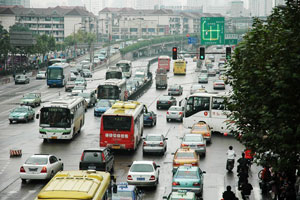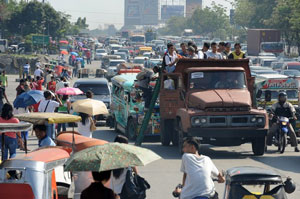Did you know that the leading cause of death among travellers are road collisions? Statistics are consistently showing that the highest risk to travellers are traffic related injuries. According to a recent study done between 2007 and 2009 by the US Department of State on American travellers and expatriates, 32% of deaths reported were related to road accidents.
As international tourism rates are on the rise and more people around the world are buying cars, many road safety and health advocates are sounding the alarm. In fact, the UN has declared 2011-2020, the Decade of Action for Road Safety.
 |
 |
| Left: Road traffic in Shanghai. Photo credit: Mr. Uncut | Right: Sharing the road in Manila. Photo credit: Mr. Uncut |
Why so many injuries?
There are many factors contributing to road related injuries abroad. During travel, it’s common to ignore or be lax about road safety rules we uphold back home. The instinct is to do as the locals do, but this can get you into trouble.
In addition to the typical traffic risks we encounter every day back home, there are additional challenges to take into account during your trip:
- Fatigue due to jet lag can impair your driving.
- Distractions, getting lost on unfamiliar roads.
- Different driving culture (ie. honking, speeding, no signalling).
- Unfamiliarity with driving and pedestrian rules (ie. driving on the opposite side of the road, roundabouts, no right turns on red lights, pedestrian right of way).
- Poor road lighting and uneven road surfaces, no shoulders.
- Lack of traffic warning signs and unprotected contours (ie. tight curves, hidden roads and driveways, cliffs).
- Road safety rules are not enforced.
- Overcrowded roads and mixed use traffic (ie. all types of vehicles share the road, including animals and pedestrians).
- Vehicles may not have safety features like seat belts or airbags; poorly built or not maintained properly.
You should also consider the medical consequences of being involved in a traffic accident. Many countries do not have Emergency Medical Services. Not having a paramedic at the scene can contribute to further injuries.
Furthermore, consider the legal implications being in a traffic accident. Is there no-fault insurance? Does a police officer have to be present at the scene of the accident? Were you a witness to an accident? Can you be sued? These are questions that consulate or embassy officials can answer.
Tips for road safety during travel
The golden rule is to use common sense. Being constantly alert to your surroundings and actively engaging in safe road practices will reduce the risk of an accident.
Pre-travel prep
- Learn the road safety rules of your destination.
- Research reputable bus and taxi companies, including motorcycle, scooter, and bike rentals with good safety and maintenance records.
- Rent a car from a reputable company. Read the fine print and learn about the possible implications of not getting insurance and adding additional drivers to your contract.
- Find the name of a reputable doctor or hospital. Don’t forget to register with your consulate or embassy for legal help in case of an accident.
- Consider getting travel health and evacuation insurance. You may already be covered through your credit card or employee benefits. Read the policy and fine print to ensure that you’re fully covered.
Pedestrians
- Look to your left and your right, and be aware of traffic patterns before crossing the street.
- Respect pedestrian traffic signs. Even if it seems safe to cross, a speeding vehicle or a fall will endanger you. Avoid jaywalking.
- Be alert at intersections and watch for erratic drivers. Hearing traffic is also important for your safety. Avoid using earbuds to listen to music or podcasts while walking.
Taxis and buses
- Get only into marked taxis and sit in the back seat. Use a seat belt and make sure all passengers buckle up with seat belts in proper working condition.
- Avoid driving in overcrowded, top-heavy buses.
- Also avoid getting into a bus whose driver is agitated, seems overtired or under the influence.
- If you feel unsafe, tell the driver to stop and get out. You can usually get a sense of their driving in the first few minutes of the trip.
Cars
- Buckle up! Always use a seat belt and ensure that all passengers use it. Do not get into a vehicle that does not have functioning seat belts for all passengers.
- Check tire pressure, treads, brakes, headlights, and wipers.
- Avoid driving at night. Rearrange your schedule so that driving occurs during the day.
- Do not use mobile devices while driving. While you may want to take a hands-free device along, this is not recommended if you’re unfamiliar with the roads. Some countries, Portugal for example, have banned hands-free talking devices.
- Do not drink or consume drugs (even small amounts) prior to driving. Some countries, such as Saudi Arabia, Singapore, have zero tolerance.
Motorcycles, mopeds, scooters, bicycles, and rickshaws
- Always wear a helmet, even if it’s not required by law. Make sure it fits properly and that the protection standards are up-to-date. The best option is to bring one with you from home.
- Use a reflective vest or tape, wear bright clothes.
- If you do not have experience driving these types of vehicles, do not learn abroad.
- Avoid driving and cycling on wet surfaces and at night.
- Avoid riding motorcycle / moped taxis or rickshaws.
Children
- Tell your child about the road safety rules of your destination.
- Always cross the road holding their hand.
- Rent a child car seat from a reputable company. If you bring your own from home, make sure that it’s compatible in the cars you will be using at your destination (ie. can be properly secured).
Below are links to country Road Travel Reports and general information on road safety abroad:



